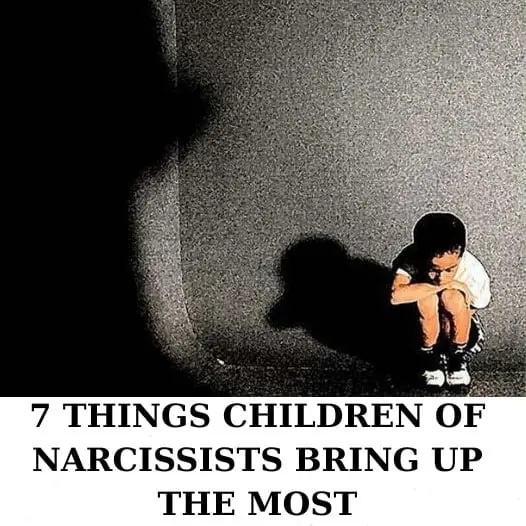
7 Common Struggles Children of Narcissists Talk About the Most

Growing up with narcissistic parents often leaves lasting imprints that extend well beyond childhood. The dynamics of such a household can shape a child’s identity, relationships, and even professional life well into adulthood. While every individual’s story is unique, many share strikingly similar challenges. Over time, these recurring themes have become well-documented patterns—powerful reminders that the struggles are not random, nor are they faced alone.
Recognizing these patterns is often the first step toward healing. By naming them, individuals can begin to process their experiences, find validation, and connect with others who have lived through similar dynamics. Here are seven of the most common struggles reported by children of narcissists—and why they matter.
1. Constant Pressure to Earn Love
Children often feel they must “perform” to receive affection. Love becomes conditional, tied to achievements, appearance, or compliance with a parent’s expectations. This can leave adults with an enduring sense that their worth depends on external validation.
2. Lack of Emotional Safety
In narcissistic households, a child’s feelings may be dismissed, minimized, or ridiculed. Over time, this undermines trust in one’s own emotions and makes it difficult to express vulnerability in later relationships.
3. Blurred Boundaries
Parents who are narcissistic may treat their children less as individuals and more as extensions of themselves. This can blur personal boundaries, making it difficult for children to develop a strong sense of independence and autonomy.
4. Chronic Self-Doubt
Growing up under constant criticism or unrealistic standards fosters insecurity. Many adult children of narcissists struggle with perfectionism, overthinking, or an inner voice that is harshly self-critical.
5. Difficulty in Relationships
The early lessons learned at home—manipulation, conditional love, and unpredictability—often echo in friendships and romantic partnerships. Adults may either avoid intimacy altogether or fall into cycles with controlling or emotionally distant partners.
6. Guilt and Obligation
Even in adulthood, children of narcissists often feel a strong, sometimes overwhelming sense of obligation toward their parents. This lingering guilt can make it difficult to set healthy boundaries or prioritize their own well-being.
7. Struggle with Identity
Perhaps the most profound challenge is the question of identity. When a child grows up molded to fit a parent’s desires, they may enter adulthood unsure of who they truly are, what they value, or what they want from life.
Moving Toward Healing
While these struggles can feel deeply isolating, they are widely shared. Understanding that these patterns exist—and that they stem from unhealthy family dynamics rather than personal failure—can be profoundly liberating.
Therapy, support groups, and open conversations play a vital role in breaking free from old cycles. With time, many adult children of narcissists learn to reclaim their voices, set healthy boundaries, and build lives defined not by their parents’ shadows but by their own authentic selves.
✨ Conclusion: The legacy of growing up with narcissistic parents is complex, but not insurmountable. By naming these common struggles and recognizing their impact, survivors can take powerful steps toward healing and, ultimately, toward redefining their own stories.
News in the same category


48 Years Since Humanity Reached for the Stars: Honoring the Launch of Voyager 2

The Bizarre “Hitman Chain” Case in China: A Murder-for-Hire Gone Wrong

Taylor Swift and Travis Kelce Delight Fans With Engagement Announcement

Woman’s heartache after tragic car crash kills husband and children

It’s been a rough few years for Simon Cowell

Spain’s Vortex Bladeless Reinvents Wind Power with Blade-Free Turbines

Even the flies thought he was dead – his amazing recovery will make you cry

More people are dying from heart failure, doctors warn: give up these 4 habits now

‘Mutant deer’ with bubble skin sparks outbreak fears in US

Cat, who ran into burning building five times to save her babies, is honored

Study Finds Fathers’ Involvement Key to Boosting Children’s Academic Success

“Nobody noticed”: 9-year-old lived alone for 2 years, fed himself, and kept good grade

Bear Caesar is finally free after having spent years locked in a torture vest

Oxford Scientists Create “Superfood” to Save Honeybees From Collapse

Popular shampoo recalled over deadly bacteria risk

9-year-old dies after dental procedure

How Learning Music Shapes Young Minds

Bedtime Stories: A Simple Ritual With Lifelong Benefits
News Post

🍪 Chocolate Chip Cookie Dessert Stacks

🍮 Mini Caramel Cheesecakes Recipe

🧁 Mini Blueberry Mousse Cakes

🍰 Blueberry Gradient Mousse Cake

No More Fine Lines Thanks To Clove Orange Anti-Aging Oil

Are you sleeping on hidden toxins?

Age 40 Is the Decisive Point for Life Expectancy:

This is what really happens during cremation, and it’s not pretty

12 signs that may signal a brain aneurysm — Don’t ignore them

Hospice chef reveals the one comfort food most people ask for before they die

48 Years Since Humanity Reached for the Stars: Honoring the Launch of Voyager 2

Homemade Teeth Whitening: White Teeth in Just 2 Minutes!

Can Cloves Heal Damaged Lungs? Discover Healing Tea Benefits

Discover the Aidan Fruit Elixir: The Ultimate Wellness Secret Every Woman Needs!

Goosegrass: The Unsung Hero for Kidney Health and Natural Detox You Need to Know

Transform Your Life with Vaseline: 18 Genius Hacks for Beauty and Home

Unleash Your Inner Strength: The Ultimate Power Boost Smoothie for Men! 🍌🔥

Unlock the Secret Power of Aloe Vera and Honey: Nature’s Ultimate Bacteria and Fungi Fighter!
